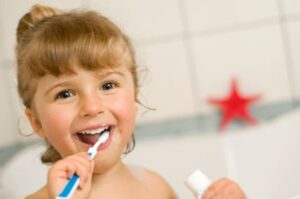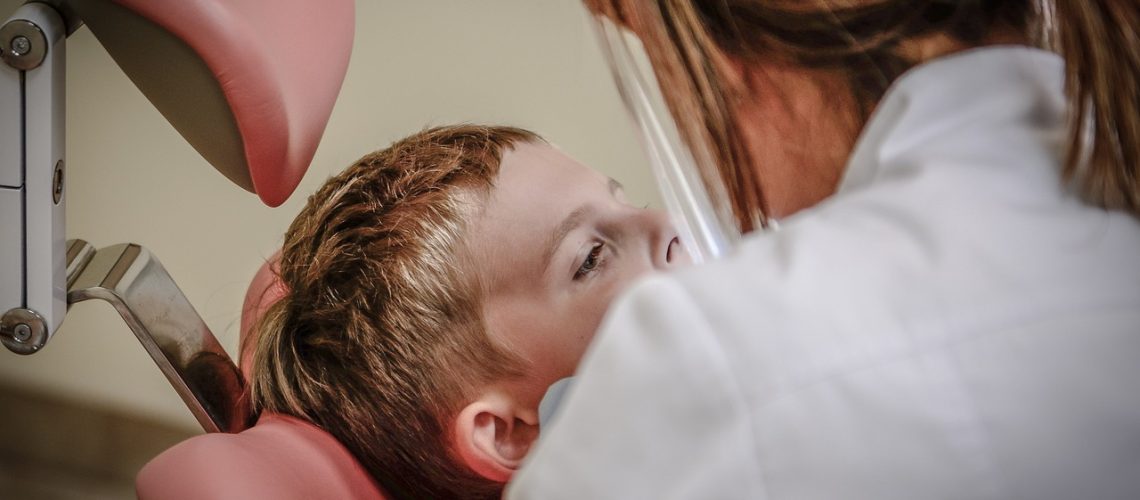Table of Contents
- Key Points
- Do I Need to Take My Infant to the Dentist?
- What Age Should You Bring a Child to the Dentist?
- What Will My Child’s First Dental Visit Entail?
- What Can I Do to Improve My Child’s Oral Health Between Visits?
- Should I Visit a Pediatric or Family Dentist?
- Schedule Infant Dental Care Today
- References
Dr. Yassee Pirooz is a Board Certified pediatric dentist in Raleigh, NC. She explains what to expect for a child’s first dental appointment: SEE VIDEO
Key Points
- While the prevalence has been steadily decreasing, tooth decay and cavities remain a major health concern for a large percentage of children in America.
- Early intervention is one of the best things parents can do to mitigate risks.
- It can be difficult to know when is the best time to take a child to their first dentist visit.
- Some key factors that can aid in making this determination.
According to a report by the National Institute of Dental and Craniofacial Research, dental caries (tooth decay or cavities) are the most common type of chronic disease among youth ages 6 to 19. While prevalence increases in older groups of children, more than 21 percent of youth ages 2 to 5 have dental caries.1
The good news is that there are many things parents can do to help their infants avoid tooth decay and cavities at a young age. The main one is scheduling regular dental checkups as soon as needed.
When should you take your child to their first dental appointment? That is a difficult question to answer, since it relies on several variables that may be unique to your child.
This article explores what those are. Keep reading to find out what factors will influence when you should make your child’s first dental appointment.
Do I Need to Take My Infant to the Dentist?
Yes, you should take your child to the dentist long before they regularly have teeth coming in (teething). There are several reasons for this, but the main one is prevention.
Regular dental care (or lack thereof) can have serious impacts on your child’s life. According to a study published by the International Journal of Dentistry, poor oral health in children results in negative quality-of-life impacts that can sometimes last for years, decades, or the child’s entire life.2
On the flip side, early interventions lead to promising dental health outcomes. Dentists and hygienists can catch and address minor problems before they become minor ones. They also present an opportunity for dentists and staff to provide parents with information on how to properly care for their child’s teeth and gums at home, including brushing and (later on) flossing.
According to the American Academy of Pediatric Dentistry, early dental visits save families time and money. Among 40,000 children in a particular study, if the first dental visit age was delayed until 4, there were an average of 3.6 more dental procedures performed on the child during adolescence than if the first dental visit was before age 4.
A final benefit of visiting a dentist earlier rather than later is that it helps the child become acclimated to the dental office environment. That can translate to better comfort and less anxiety down the road.
What Age Should You Bring a Child to the Dentist?
Each child is unique, so there is not a one-size-fits-all answer to when you should schedule your first dental checkup. However, there are a few factors that can help you make this determination.
What is a good age for a first dental visit? Due in part to the chaos of a baby’s first year, many people do not schedule their first dental visit until age 2. While this is better than not going at all, it could be too late to catch some issues.
A good rule of thumb is to take your child to the dentist no later than their first birthday or within six months of their first tooth coming in, whichever is earlier.3 As mentioned in the intro, tooth decay, and other oral health problems can start early, so staying ahead of the potential for issues is key.
If your child is experiencing oral health issues before this time, it does not hurt to schedule a dentist visit. For instance, extreme teething discomfort can cause:
- Swollen gums
- Drooling
- Fussiness
- Chewing on objects
Excessive thumb or pacifier sucking can impact tooth alignment later on. Babies can also accidentally bite their tongue or cheek, causing minor injuries. If you suspect any of these, a visit to the dentist can provide your child with relief and you with peace of mind.
What Will My Child’s First Dental Visit Entail?
In most cases, a child’s first dental exam will be completed in very little time—usually within a half hour. It will involve an evaluation of their teeth, jaws, gums, and oral tissues for proper development. The dentist will also examine the child’s bite.
If needed, a dental hygienist can perform a gentle cleaning. This will remove plaque or tartar (plaque buildup) on the teeth, in addition to any stains. The hygienist can also show you ways to properly clean the infant’s teeth at home (see below) and will advise you on the need for any fluoride treatments, such as in cases of enamel defects.
In most cases, routine X-rays are not conducted on the first office visit. They are only used as needed, including to diagnose severe tooth decay or uncommon circumstances, like root damage associated with a jammed baby tooth.
After the first visit, your dentist will likely recommend that your child come in every six months, just like adults. More frequent visits may be warranted if there are issues or concerns.
What Can I Do to Improve My Child’s Oral Health Between Visits?
One of the best things a parent can do to maintain oral health is to start cleanings before your child’s teeth start coming in. Use a damp cloth to gently rub their gums, which can remove any food particles and disrupt the accumulation of bacteria.

You can (and should) start brushing whenever your child’s first tooth appears. Use a very small amount of fluoride-free toothpaste (about the size of a grain of rice) and gently massage the tooth with a soft-bristled brush. After about three years of age, or whenever the child is old enough to spit the toothpaste out, you can shift to fluoridated toothpaste.
Watching your child’s diet is good for their overall health, but it can contribute to healthy teeth and gums as well. Foods with a lot of sugar and starch can make your child more susceptible to cavities. Limiting things like sticky candies and sweetened drinks can mitigate that threat, as can avoiding them close to bedtime.
“Baby bottle tooth decay” refers to situations where an infant falls asleep with a bottle in their mouth. This encourages the liquid to pool around their teeth, leading to the production of bacteria and acids that attack tooth enamel.4
You can avoid resulting tooth decay by limiting these incidences. Do not allow your child to use a bottle as a pacifier, and do not use bottles for sugary drinks (like juices). You can also encourage your baby to start using a cup around their first birthday.
Should I Visit a Pediatric or Family Dentist?
A pediatric dentist is one who only sees children, while a family dentist is a general dentist who can treat patients of all ages, from childhood through adolescence and into adulthood. There are advantages to each.
Visiting a pediatric dentist in Raleigh gives you access to specialized training the dentist underwent following dental school. They will possess unique knowledge and expertise in the following areas areas as they relate to pediatrics:
- Sedation
- Pharmacology
- Surgical procedures
- Child psychology
- Behavior management
The advantage of visiting a family dentist is that it will provide more continuity as the child gets older. They will visit the same office and see the same staff as they age. The dentist will be familiar with the patient’s history of care and can make decisions based on it.
Schedule Infant Dental Care Today
Understanding both the importance of early dental care and the factors that influence when to schedule your child’s first visit is important. Following the advice above will help you decide the course of action that is right for you and your family, and how to optimize the health of your child’s teeth and gums between visits. An experienced family or pediatric dentist in Raleigh, NC, can further advise you on the best cleaning schedule or other needed interventions.
References
- “Oral Health in America: Advances and Challenges,” U.S. Department of Health and Human Services, National Institutes of Health, National Institute of Dental and Craniofacial Research, 2021, from: https://www.nidcr.nih.gov/sites/default/files/2021-12/Oral-Health-in-America-Advances-and-Challenges.pdf.
- Shokravi, Marziyeh, Fatemeh Khani-Varzgan, Mohammad Asghari-Jafarabadi, et al., “The Impact of Child Dental Caries and the Associated Factors on Child and Family Quality of Life,” International Journal of Dentistry, from: https://pmc.ncbi.nlm.nih.gov/articles/PMC10404155/.
- Baker S.D., Lee J.Y., Wright R., “The Importance of the Age One Dental Visit,” Pediatric Oral Health Research and Policy Center, American Academy of Pediatric Dentistry, 2019, from: https://www.aapd.org/globalassets/media/policy-center/year1visit.pdf.
- Achalu, Priyanka, Abhishek Bhatia, Bathsheba Turton, Lucy Luna, and Karen Sokal-Gutierrez, “Sugary Liquids in the Baby Bottle: Risk for Child Undernutrition and Severe Tooth Decay in Rural El Salvador,” International Journal of Environmental Research and Public Health, December 2020, from: https://www.mdpi.com/1660-4601/18/1/260.

